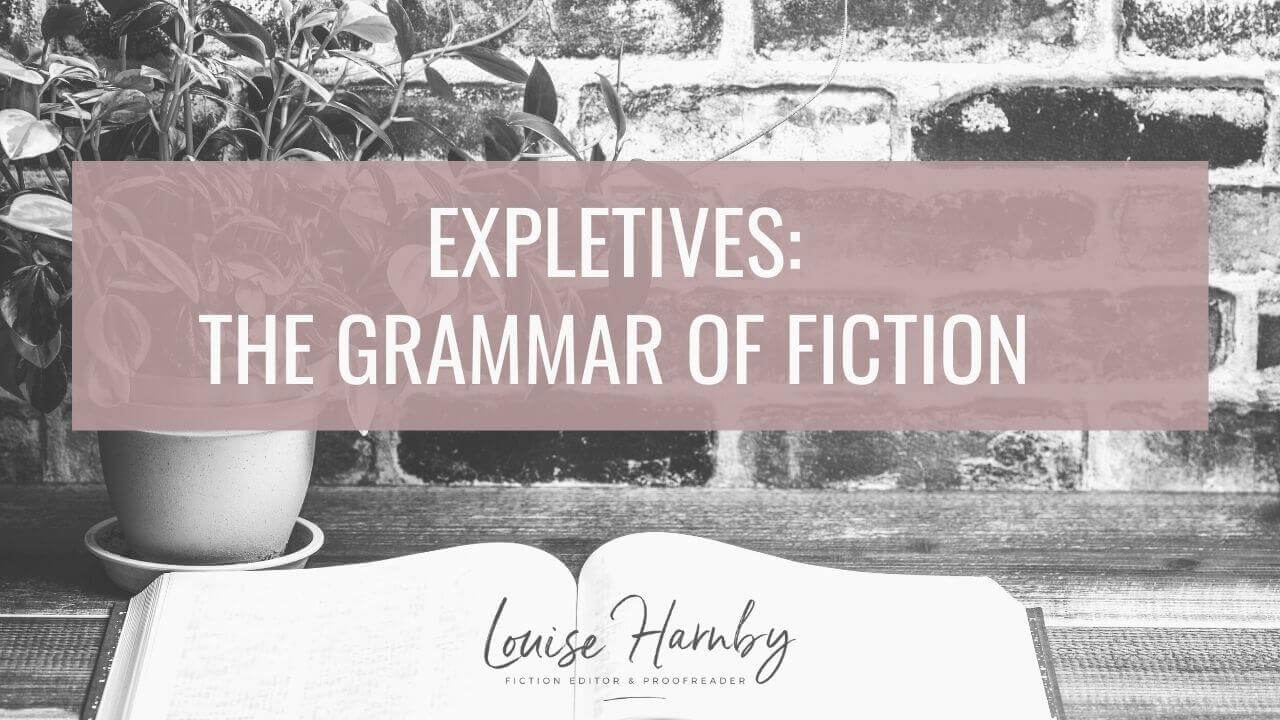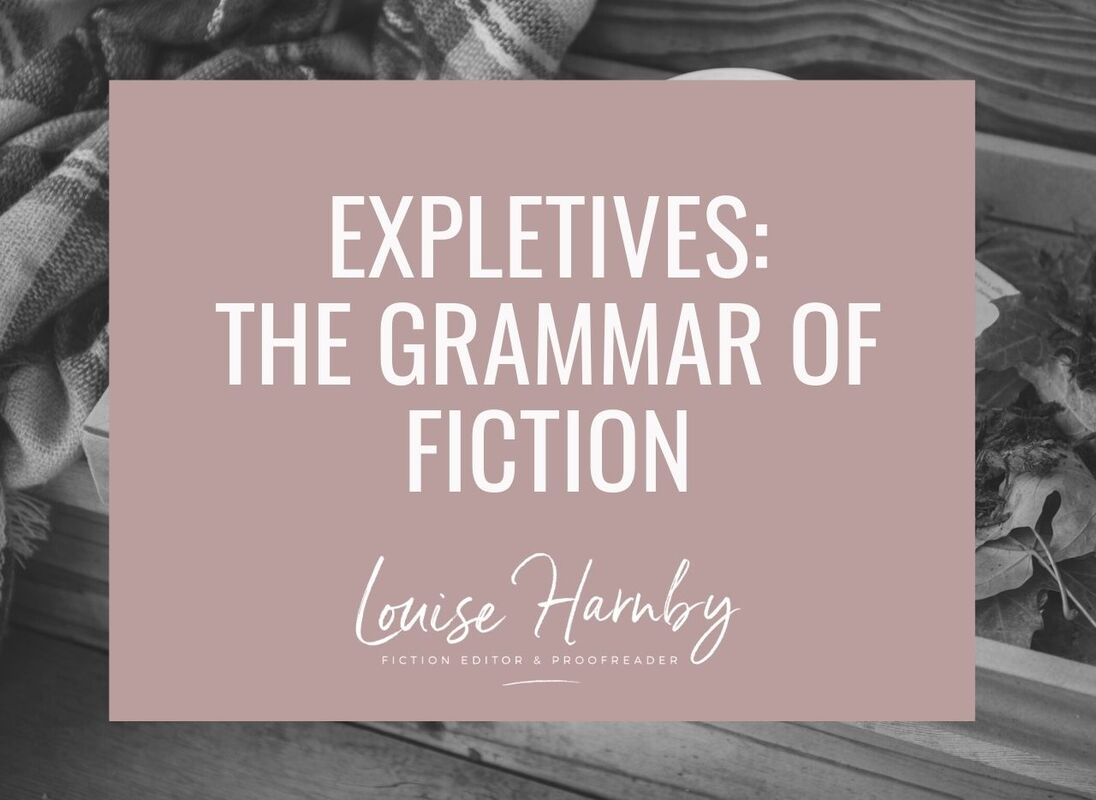|
Want to use grammatical expletives in your fiction? These words serve as place holders or fillers in a sentence. They shift emphasis and can affect rhythm. Used injudiciously, however, they can be cluttering tension-wreckers. Here's how to strike a balance.
Because expletives shift emphasis, they have a syntactic function. However, they don’t in themselves contribute anything to our understanding of the sentence. In other words, they don't have a semantic role. You might also see them called syntactic expletives.
Common examples are:
Take a look at the following pair. The first sentence is introduced by an expletive.
When used well, expletives are enrichment tools that allow an author to play with a narrative voice’s register and the rhythm of sentences. When prose is overloaded with them, it can feel cluttered with filler words that add nothing but ink on the page. At best, they widen the narrative distance between the reader and the POV character; at worst, they flatten a sentence and destroy suspense and tension.
Flat expletives that merit fixing
Too much telling of what there is or was can rip the immediacy from a scene and encourage skimming. That’s a problem – it means the reader isn’t engaged and risks missing something. Furthermore, if they’re not performing their rhythmic or emphasis role, expletives make sentence navigation more difficult because all they're doing is cluttering the prose. Here's an example. Think I've overworked it? There are published books from mainstream presses with passages just like this made-up one.
FLAT EXPLETIVE
It was a tiny room. There was a light switch with rust-coloured smudged fingermarks on the melamine surface. Was that blood? There was a noise coming from beyond on the back wall. It was a high-pitched whimper. Then there was silence. She held her breath and tiptoed forward. Suddenly there was a scream. The problem with the expletives in the passage above is that readers are bogged down in what there was rather than the viewpoint character's experience of discovery. Let's revise it to fix the problem.
THE FIX
The room was tiny. Rust-coloured fingermarks smudged the melamine surface of the light switch. Blood maybe. A noise came from beyond a door on the back wall. A high-pitched whimper. Then nothing. She held her breath and tiptoed forward. A scream shattered the silence. Notice how the narrative distance has been reduced in the revised passage. Now it's as if we're in the viewpoint character's head, moving with her second by second. We can focus on the room, the dried-blood fingermarks, the whimper, and the scream rather than the being of those things – their was-ness. Removing the expletives and swapping in stronger verbs (smudged, shattered) enables us to tighten up the prose and introduce immediacy. And now there's no need for the told 'suddenly' – we experience the suddenness through the in-the-moment shattering.
Expletives that pack a punch
As is always the case, obliterating expletives from a novel would be inappropriate because sometimes they're the perfect tool to help out with rhythm and emphasis. The opening paragraph of Charles Dickens’s A Tale of Two Cities (p. 1) uses expletives galore, and masterfully at that. The repetition (anaphora) brings a steady rhythm to the passage that ensures the reader gives equal weight to the contrasting extremes – from best and worst to hope and despair. The expletives introduce a detached sense of reportage that forces us forward rather than allowing us to dwell on any of the heavens or hells on offer. It’s simultaneously mundane and monstrous, and that's why it's magical.
It was the best of times, it was the worst of times, it was the age of wisdom, it was the age of foolishness, it was the epoch of belief, it was the epoch of incredulity, it was the season of Light, it was the season of Darkness, it was the spring of hope, it was the winter of despair [...]
And here’s an example from Dog Tags (p. 1) where omission of the expletive would rip the energy from the opening first line of the chapter and interfere with our understanding of which words we’re supposed to emphasize.
“Andy Carpenter, Lawyer to the Dogs.”
That was the USA Today headline on a piece that ran about me a couple of months ago. Summing up Grammatical expletives are a normal part of language and have every right to be in a novel. Overloading can destroy tension and make for a laboured narrative, but a purposeful peppering can amplify character emotion, moderate rhythm, and make space for the introduction of big themes in small spaces without sensory clutter. Cited works and further reading
Louise Harnby is a line editor, copyeditor and proofreader who specializes in working with crime, mystery, suspense and thriller writers.
She is an Advanced Professional Member of the Chartered Institute of Editing and Proofreading (CIEP), a member of ACES, a Partner Member of The Alliance of Independent Authors (ALLi), and co-hosts The Editing Podcast. Visit her business website at Louise Harnby | Fiction Editor & Proofreader, say hello on Twitter at @LouiseHarnby, connect via Facebook and LinkedIn, and check out her books and courses.
2 Comments
Lindsey Russell
12/10/2020 02:11:28 am
It's late - I'll have to come back and read this properly when the brain isn't craving sleep because I totally misunderstood what this article was going to be about.
Reply
Lindsey Russell
14/10/2020 01:22:49 am
Ah! Got it second time round..
Reply
Leave a Reply. |
BLOG ALERTSIf you'd like me to email you when a new blog post is available, sign up for blog alerts!
TESTIMONIALSDare Rogers'Louise uses her expertise to hone a story until it's razor sharp, while still allowing the author’s voice to remain dominant.'Jeff Carson'I wholeheartedly recommend her services ... Just don’t hire her when I need her.'J B Turner'Sincere thanks for a beautiful and elegant piece of work. First class.'Ayshe Gemedzhy'What makes her stand out and shine is her ability to immerse herself in your story.'Salt Publishing'A million thanks – your mark-up is perfect, as always.'CATEGORIES
All
ARCHIVES
July 2024
|
|
|
|



















 RSS Feed
RSS Feed





